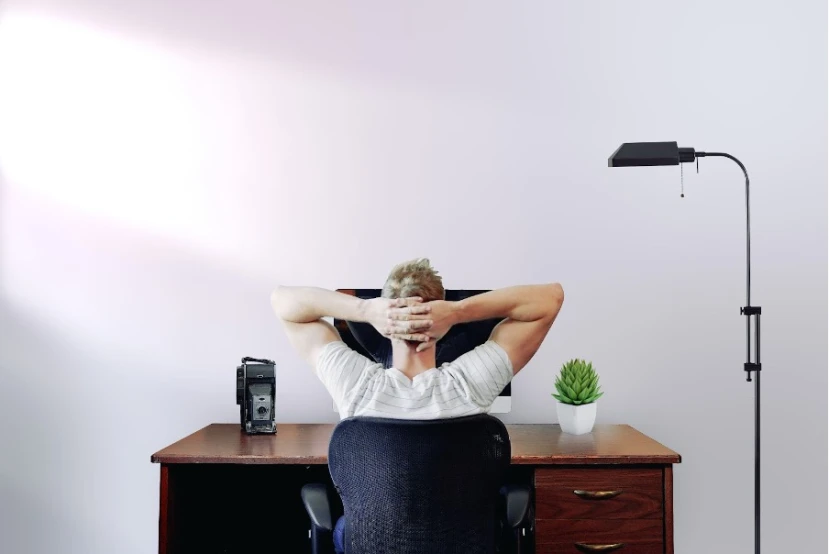Security tips for working from home
Posted February 15th, 2022 by SimpliSafe

Since our world turned upside down in 2020, it’s fair to say that the perception of an ideal working set-up has changed considerably, as fully remote and hybrid working is mostly the norm, depending on what sector you work in. A recent study revealed that a massive 71% of UK professionals would think about leaving their current organisation if flexible working wasn’t an option, so it’s likely that staff will continue to have the freedom to choose where and how they work.
When working in a controlled setting, it’s easy to keep track of devices that could be at risk. Employers are advised to take additional safety measures to ensure the complete protection of everything and everyone inside the workplace, from educating staff on cyber security risks, to installing physical security systems. This same mentality should be applied to a remote working set-up, and although it’s more tempting to kick back and relax in the comfort of your own home, it’s just as important to be on a constant lookout for any potential threats. By following these security tips for working from home, you’ll be provided with everything you need to stay protected.
Keep your valuables out of view
It goes without saying, but especially in cases where your home office is on the ground floor, make sure you’re keeping valuables out of sight. A shiny laptop or mobile phone could lure a burglar into your home, so make the effort to keep blinds and curtains closed to protect against prying eyes, or hide items when you’re not using them. For instance, keep your work devices inside a zipped-up bag that’s nestled in your wardrobe when not in use.
For additional protection, you could rely on the help of a home security system. By installing devices equipped with high-tech smart tech, like our SimpliCam, to keep watch over your home, you can feel rest assured that your valuables will be safe. With 24/7 professional monitoring, in an alarm event we can respond to an incident when you’re unable to. For instance, if the Motion Sensor detects movement, our professional monitoring centre will receive an alert and if we can visually verify a break-in on your security camera, we’ll alert the police.
Lock the doors when leaving the house
If you’re the last one out, you wouldn’t leave work without locking up the office, so don’t forget to do it when you leave home, too. The same goes for any other entrances that a burglar could break-in through - including the ground floor and upstairs windows. So, for times when you want to pop out for a coffee break or to get some fresh air, double check you’ve locked up, because an open entrance instantly puts your valuables at risk.
For additional protection, our Entry Sensor is designed to make all possible entrances to your home as secure as possible. If someone does try to break-in, your alarm will sound, alerting our professional monitoring centre (if subscribed), who can visually verify whether there’s an emergency.
Don’t let family members use work devices
If you’re living with family members, little ones could toddle into your home office and have a play on your work devices if you’re not careful. It’s important that you don’t let this happen, as although it may seem harmless, you could end up unintentionally putting your business at risk. In cases where your devices aren’t protected with a secure password - more on this shortly - they could end up downloading an infected file, accidentally deleting sensitive data, or connecting to an unsecure network. By regularly reminding your family to not go on these devices, you’ll avoid potential disaster.
Creating a strong password
Setting easy-to-guess passwords on your work devices is a no-no, especially after the UK’s National Cyber Security centre revealed that 123456 was the most widely-used password on breached accounts. There are several steps you can take to ensure that you’re creating a strong password, such as being very careful who you trust with them (if anyone at all), updating passwords regularly, never using the same password for multiple accounts, or using ones that would be easy to guess. For those that have their pet’s name or mother’s name as a password, remember that information can be easily obtained from social media sites - hackers will always do their research.
Install antivirus software
Alongside installing physical security methods, ask your employer to install antivirus software on all of your work devices if they haven’t already. Or if you’re self-employed, you could do this yourself. This will protect them against anything from spyware to phishing attacks, and it’s a great way to cover all bases if you do accidentally land on a dodgy site or download a risky file. After detecting a virus, the antivirus software will remove it from your system to prevent any further harm.
Look out for email scams
In 2021, it was revealed that a whopping 36 million Brits had been targeted by a scammer, so always keep an eye out for malicious emails when working from home. Read each one carefully, checking the grammar and spelling, noting whether it comes with a suspicious attachment (never download attachments unless you trust the sender) and if there are any inconsistencies in email addresses, the domain names and links. Question whether the message seems too good to be true, and act with caution.
Here at SimpliSafe, we want to ensure that you and your family feel protected at all times, whether you're working from home or out and about. Have a chat with us today to see how our security system works, and start customising your own today.